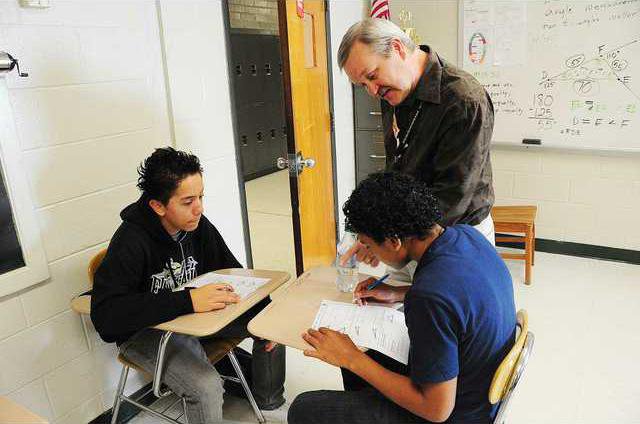Math curriculum time line
1985: Georgia passes the Quality Basic Education Act of 1985, which establishes the Quality Core Curriculum standards
1988: QCC standards go into effect
2002: No Child Left Behind legislation passes; Phi Delta Kappa International conducts an audit of QCC standards and finds them not up to par
2004: Georgia Performance Standards adopted as QCC replacement
2008: GPS and integrated math curriculum go into effect
2010: Common Core Standards released for public comment and officially adopted
2011: Georgia school systems allowed to choose whether to teach integrated or a more traditional discrete math
2012: Common Core Standards go into effect; recommended for school systems to use a discrete math format
Georgia will teach math subjects separately next year, only four years after the state switched to a curriculum that integrated various types of math into one class.
The announcement last week from State School Superintendent John Barge comes on the heels of Georgia adopting the Common Core Standards curriculum in place of its existing Georgia Performance Standards. Georgia joins more than 40 states looking to make the transition.
"It's our belief that Dr. Barge made the only reasonable decision he could," Hall County Schools Superintendent Will Schofield said. "(The other states with Common Core) are all going to teach and adopt the more traditional approach."
If Georgia maintained the integrated approach it adopted in 2008, it would have to come up with the tests and resources on its own instead of sharing with other states, which is what other subject areas are able to do.
"We're going to have the same standards. It's more of how you organize the standards," said Mike Buck, chief academic officer for the Georgia Department of Education. "This delivery model will allow the students to go into more depth and understanding before going forward."
Georgia Performance Standards required that integrated math be taught in Math I, II and III courses for high school students, combining principles of algebra, geometry and statistics.
The recommended and more traditional discrete math courses to be taught under Common Core include coordinate algebra, analytic geometry, advanced algebra and precalculus. Accelerated courses offered in the curriculum are coordinate algebra/analytic geometry A, analytic geometry B/advanced algebra and precalculus.
"It's not going back, per se. It does integrate a lot of math, but in a sequence of algebra, geometry and algebra II," Gainesville City Schools Superintendent Merrianne Dyer said. "It's not the same, but the presentation of the bulk of the content is discrete."
One of the ideas behind Common Core is comparability, Buck said.
"It allows for economies of scale when it comes to assessments," he said. "It's very difficult to get textbook publishers to do materials for just one state. What we're hearing from our counterparts is everyone is going to a more discrete model, and as a department we can't support two different curricula."
The Common Core Standards for math will be implemented and realigned in every grade level, though they affect high school the most.
"Our (Georgia Performance Standards) curriculum aligns nicely with Common Core. What teachers are learning in more detail is the sequence and what is done best by grade level," Buck said.
Matt Cardoza, director of communications for the Georgia Department of Education, said the Georgia Performance Standards have a 91 percent alignment to the Common Core Standards, so not much material-wise will change next year.
All the Common Core Standards will be phased in beginning with next year's ninth-grade students.
"The intent will be for incoming freshman — we're going to gradually put this in," Buck said.
He said the department won't "pull the rug out from under" those already taking the integrated math classes.
"The students in 10th, 11th and 12th grade will continue through graduation using integrated math," Dyer said. "This is similar to what we did when we phased in integrated math. We just finished getting those kids out, so running dual math programs is not new."
As for textbook resources, Dyer said the integrated math books can be used in the Common Core curriculum. Instead of having one book for each subject, the discrete classes will use portions from all four integrated books.
With so many states adopting the standards, publishers will have a larger client base. That's good news for budget-crunched state funding.
"Ultimately prices should go down," Buck said.
New End of Course Tests will be developed to go alongside the Common Core Standards as well, Buck said. That means for the next few years, the state will be administering two different assessments — one geared toward the Georgia Performance Standards for those who started high school with that curriculum, and one for the new freshmen under the Common Core.
Buck said middle school students now enrolled in high school classes for advanced credit will still have the opportunity to earn that credit. He said it will be on a case-by-case basis whether the students will continue on with the integrated curriculum or whether they will be on an accelerated discrete path.
Gainesville City Schools do not have accelerated math programs for middle school students to get high school credit, but Dyer said the middle school is making sure this year's seventh-graders are prepared to take on a ninth-grade algebra class once they enter high school.
"Right now, Hall County has not taken an official position on that, but either way they're going to continue to be accelerated," said Melissa Stewart, math teacher on special assignment for Hall County Schools.
In 2011, school systems could choose whether to teach integrated or discrete math. Both Gainesville City and Hall County schools decided to go with the integrated format.
"Some of our teachers have flourished under integrated and some have not," Schofield said. "An integrated approach is kind of a misnomer. It was supposed to be a child solving real world problems while breaking down the math and teaching it holistically. Really that hasn't been seen."
Andy Miller, a math teacher at Gainesville High School, said many Gainesville teachers are excited about the prospect of teaching discrete classes again and the effects it will have on students' Scholastic Aptitude Tests and other college entrance exams.
"I think that with the integrated math sequencing, the geometry has been de-emphasized or at least not given the attention it should have," Miller said.
"If one sums up all the time spent on geometry in the integrated track, it comes nowhere close to what it was when we taught the course geometry. The SAT is heavy in it, and honestly I believe that's the piece where we're hurting."
Stewart said she does not foresee any problems getting students ready to take the SAT and other tests after the curriculum change.
"Our math teachers know their math," Dyer said.
"They're re-establishing a sequence that it's taught in. What the big deal is, Common Core has integrated into math some English-language arts standards."
These topics will help students learn to communicate across the curriculum and develop ways to communicate a solution.
Common Core also integrates in the sense that some geometry concepts will be used to solve an algebra problem, and vice versa, said Micah Hoyt, a math teacher at East Hall High School.
"The Georgia model of integrated math was like a fruit salad. You can see all the pieces ... if you want a chunk of apple you can pull it out. If you want a chunk of algebra, you can pull it out," he said. "The true integrated math is a fruit smoothie, where you can't pick out chunks, and what you see is just math."

